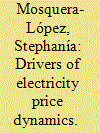| Srl | Item |
| 1 |
ID:
163533


|
|
|
|
|
| Summary/Abstract |
Against the backdrop of numerous evidence that variable renewable generation decreases electricity prices and increases price volatility, this paper assesses the drivers of electricity prices in spot and futures markets, focusing on the German electricity markets. We take into account nonlinearities in electricity prices by means of structural breaks and threshold regressions. We find that short-run and medium/long-run price drivers differ and, more importantly, that they vary over time. In the case of the spot market, the determinants of prices are renewable infeed and electricity demand, while in the futures market the main drivers are natural gas, coal and carbon prices. Our results give relevant insights for market participants who seek to optimize procurement/selling strategies in the spot market, and use the futures market to hedge against spot price volatility, which has increased due to a higher renewable generation.
|
|
|
|
|
|
|
|
|
|
|
|
|
|
|
|
| 2 |
ID:
166452


|
|
|
|
|
| Summary/Abstract |
We propose a new approach to identify pathways for countries to reduce carbon dioxide emissions (CO2) per capita through possible changes in their energy consumption portfolio. Utilizing data from the last half century (1965–2017) for 79 countries, we investigate how changes in the composition of primary energy consumption (i.e. oil, coal, gas and renewables) can contribute to changes in per capita CO2 emissions, depending on the time-varying level of individual countries’ real per capita income. To this end, threshold panel regressions (with common and fixed effects) are estimated to endogenously determine an unknown number of possible pathways (delineated by break points) to reduce emissions. This study provides important policy insights into the effects of switching from one source of primary energy consumption to another on per capita emissions, as nations progress through stages of economic development. Such relative costs can be compared and contrasted (a) across country groupings, (b) through time, as real per capita income changes, and (c) with those of other country groupings that fall within similar per capita income brackets.
|
|
|
|
|
|
|
|
|
|
|
|
|
|
|
|
| 3 |
ID:
176586


|
|
|
|
|
| Summary/Abstract |
Using panel data from 31 provinces in China, covering the period from 2003 to 2017, this article analyzes the threshold effect of factor price distortion on the technological content of exports. The results show that factor price distortion does not necessarily impede improvement in the quality of the technological content of exports. Instead, the adverse effect can be weakened when the value of per capita GDP is higher than RMB13,154 or the value of FDI goes beyond RMB480.9 billion. This is because a high regional economic development level alleviates the adverse effect of factor price distortion on the technological content of exports. Our results are robust when the dependent variable and sample years are changed. This article also addresses the endogeneity issue. We also consider the underlying mechanism through which factor price distortion affects the technological content of exports.
|
|
|
|
|
|
|
|
|
|
|
|
|
|
|
|